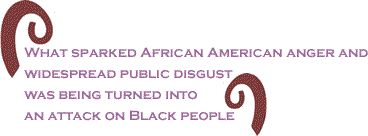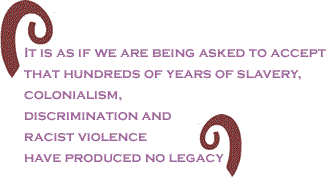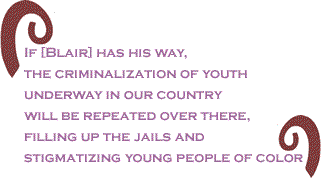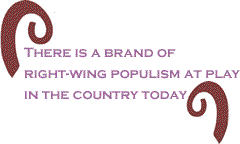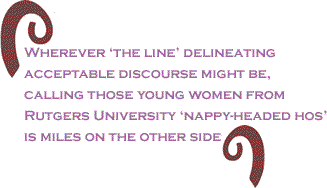
|
|||||||||||||||||||||
|
The current issue is always free to all readers If
you need the access available to a |
|
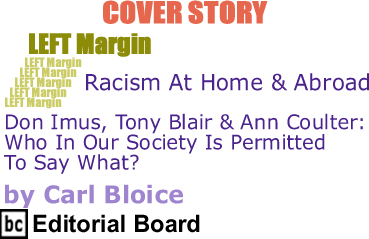 |
|
Don Imus wasn’t the only person to open his mouth and unleash a political storm on the subject of race. It went hardly mentioned in the major media of this country but as the Guardian (UK) put it, British Prime Minister Tony Blair, last week claimed a recent spate of knife and gun murders in London “was not being caused by poverty, but a distinctive Black culture.” Of course, Blair is no Imus but his comments elicited a similar reaction as the Imus affair, underscoring the ongoing effort to shift the responsibility for racism onto those most harmed by it. While Blair spouted off in Cardiff, on this side of the pond, something strange – but not unexpected – was happening. What sparked African American anger and widespread public disgust was being turned into an attack on Black people. All of a sudden the “shock jock” ranting of someone who regularly engaged in crass racism, sexism, anti-Semitism and homophobia - and his audience’s embrace of the practice - was said to pale by comparison with rap music. The objects of derision became in some quarters: “Al Sharpton, Jesse Jackson and other Black leaders” and their inability to clean up hip-hop lyrics. The African American leaders can defend themselves but it should be noted that they have addressed the problem of the corrosive influence of violence and misogyny in some rap lyrics and that there are numerous efforts underway to combat it. As Washington Post columnist, Eugene Robinson, wrote the other day, “For young Black hip-hop artists to use such language to demean Black women is similarly deplorable - and, I would argue, even more damaging. But come on, people, don't deceive yourselves that it's precisely the same thing. Don't pretend that 388 years of history - since the first shackled African slaves arrived at Jamestown - never happened.” It is just plain stupid not to recognize that there was crime long before there was hip-hop and that in every country in the world, it is most pronounced in the communities of the poorest.
What Blair and the Imus-said-bad-things-but crowd are about is evading the central problem: institutionalized racism and the political economy of the Black community – or rather, the place of people of color in the political economy of the countries involved. It is as if we are being asked to accept that hundreds of years of slavery, colonialism, discrimination and racist violence have produced no legacy. The fact, is if you go into the center of most major British or U.S. cities, you find half or nearly half of the young Black men don’t have a means of earning a living. Add to that a dearth of affordable housing, restricted access to healthcare and vastly inadequate schools and it can hardly be surprising that there is anti-social and unacceptable behavior. Blair is quite explicit about his rejection of the connection. "We need to stop thinking of this as a society that has gone wrong - it has not - but of specific groups that for specific reasons have gone outside of the proper lines of respect and good conduct towards others and need by specific measures to be brought back into the fold," he told the audience. And what should the response be? There needs to be an "intense police focus" on the minority of young Black Britons engaged in violence, the laws need to be toughened and, he said, ringleaders "taken out of circulation.” The Guardian noted that Blair's remarks “are at odds with those of the Home Office minister Lady Scotland, who told the Home Affairs Select Committee last month that the disproportionate number of Black youths in the criminal justice system was a function of their disproportionate poverty, and not to do with a distinctive Black culture.”
Rev Nims Obunge, chief executive of the Peace Alliance, a group working against gang violence, said he recently attended a meeting with Blair and that the Prime Minister had wrongly ascribed his views to him. "He makes it look like I said it's the Black community doing it,” he told the Guardian. “What I said is it's making the Black community more vulnerable and they need more support and funding for the work they're doing ... He has taken what I said out of context. We came for support and he has failed and has come back with more police powers to use against our Black children." Evidently the hapless British leader not only teamed up with the Bush Administration in the illegal and unjustified invasion and occupation of Iraq in which hundreds of thousands of people have lost their lives, he’s also taking his cue on the subject of juvenile delinquency from the former colony. If he has his way, the criminalization of youth underway in our country will be repeated over there, filling up the jails and stigmatizing young people of color.
Blair told his Callaghan Lecture audience that because he is a lame duck prime minister, he now feels free to abandon political correctness. That’s a curiously deceptive phrase that much of the public has been duped into thinking involves some principle. Political demagogues like CNN’s Lou Dobbs like to prattle on about “political correctness run amok” and hiding the truth. In fact, it is a slogan behind which some mostly white men seek justification for saying anything they feel like saying about women, or gays, or people of color. I’ve read lot of things about the Imus affair over the past two weeks and I’ve been struck by one thing in particular: the infinitesimally small number of women who have come out in his defense. I guess that’s readily understandable; nobody wants to be called a white ho either. The other day I got an email which said: “In my view no program in the country better reflected the political and cultural 'center' of the mostly white, mostly male, mostly East Coast, mostly over-30 listeners who turn him on riding to work each day.” That may well be. But therein lays a danger. There is a brand of right-wing populism at play in the country today. It opposes the war in Iraq (sometimes), objects to the North American Free Trade Agreement (because it gives too much to the Mexicans), and denounces what it calls “the war on the middle class.” But it is populism, (not the Texas populism of Jim Hightower or the late great Molly Ivins) and throughout our history, it has had an Achilles heel: racism and chauvinism. It doesn’t unite people but divides them and inhibits the evolution of a truly progressive political majority in our country.
As far as Imus is concerned, Robinson of the Post got it right. “Now that the networks have pulled the plug on Don Imus, let's have no hyperventilation to the effect that the aging shock jock's fall from undeserved grace raises some important question about just who in our society is permitted to say just what,” he wrote. “Wherever ‘the line’ delineating acceptable discourse might be, calling those young women from Rutgers University ‘nappy-headed hos’ is miles on the other side. Especially for a 67-year-old white man with a long history of racist, sexist and homophobic remarks." On a related note: Robert Wright, a senior fellow at the New America Foundation, wrote in last Saturday’s New York Times about what he called a “Imus-Coulter disparity,” observing that shock scribe Ann Coulter’s racist remarks about Middle East people hadn’t got her fired. In fact, he noted, she continues to be interviewed respectively by CNN and Fox News. And, she never apologized for calling people “ragheads.” Actually, she was invited back this year by Conservative Political Action for a second performance and she used that occasion to call a Presidential candidate a “faggot.” While it’s true that the two incidents lasted hardly one news cycle and she was never called upon to resign from anything, it didn’t go unrecorded. I wrote about the first performance at the time. My point was, as ugly as her remarks were, the really horrendous thing about the affair was the large gaggle of young Republicans who cheered her when she, as one party official put it, “threw them some red meat.” Raghead, faggot and whore (or any of those other terms describing races, genders, ethnicities or religions; you know the ones I’m talking about) are not words people should be using. Their effect is reflected by those out there in the audience - laughing or cheering. BC Editorial Board member Carl Bloice is a writer in San Francisco, a member of the National Coordinating Committee of the Committees of Correspondence for Democracy and Socialism and formerly worked for a healthcare union. Click here to contact Mr. Bloice. |
|
| Home | |
| April
19, 2007 Issue 226 |
||||||||||||||
|
||||||||||||||
| Printer Friendly Version in resizeable plain text format | ||||||||||||||
 |
||||||||||||||
|
||||||||||||||
 |
||||||||||||||
 |
||||||||||||||
 |
||||||||||||||
| |
||||||||||||||
| |
||||||||||||||






















